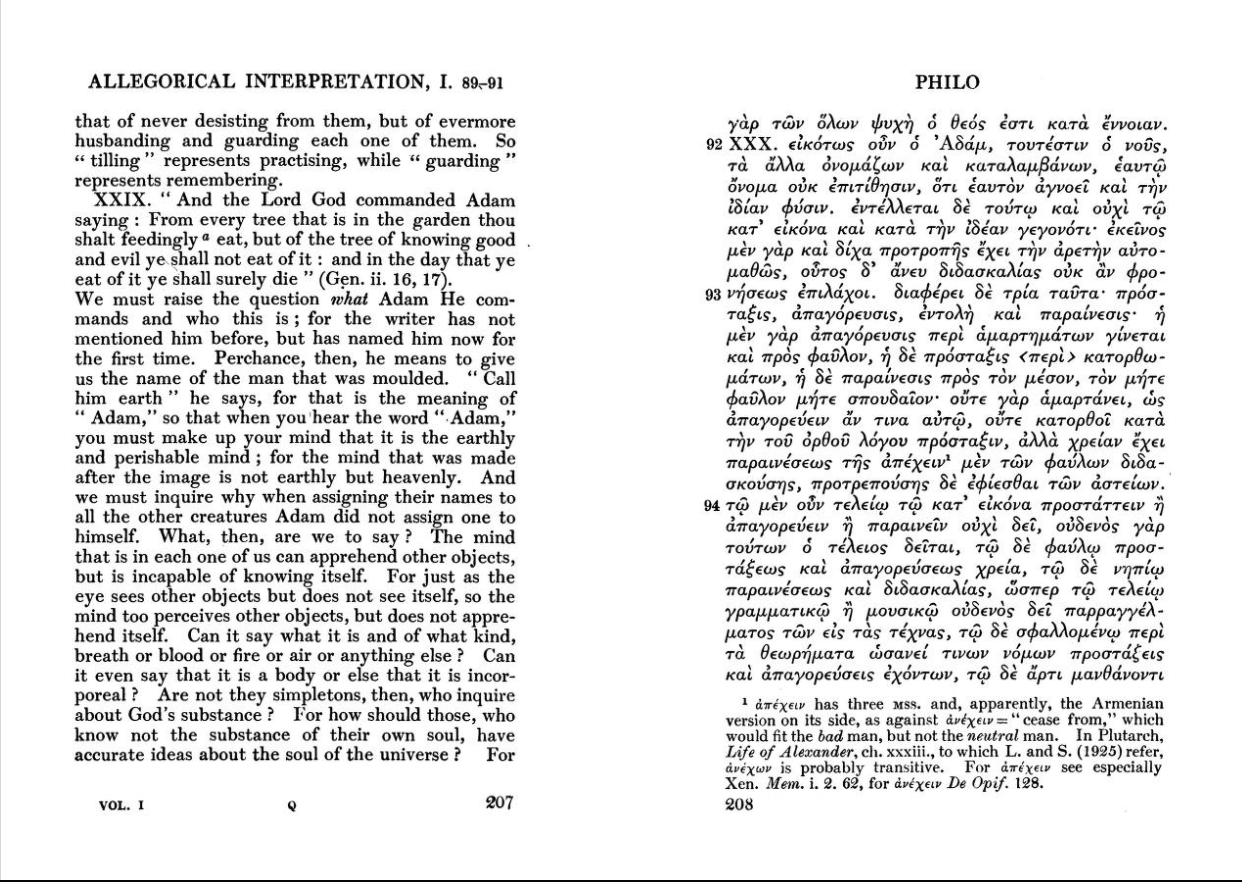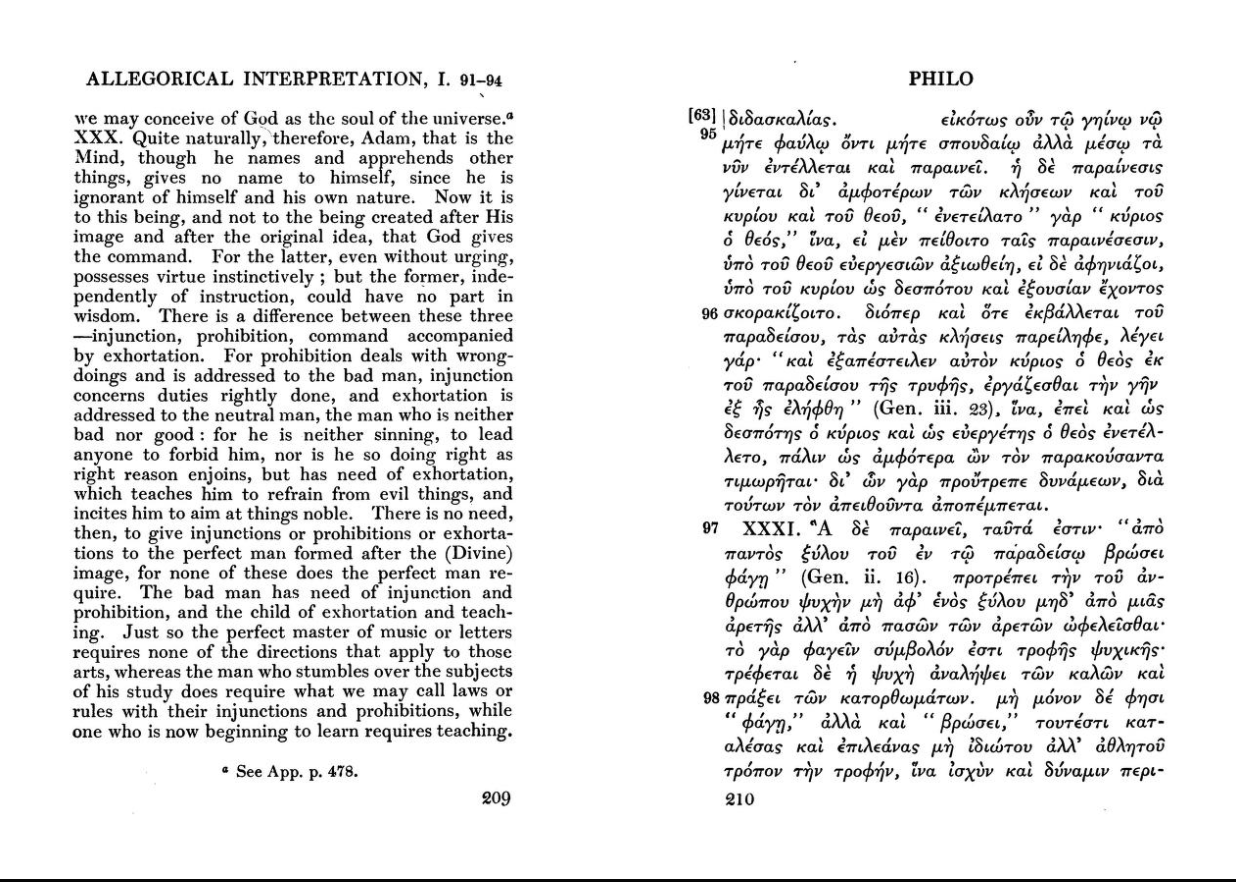Philo of Alexandria provides an allegorical interpretation of the name "Adam" and that "the mind that was made after the image is not earthly but heavenly."
- Type
- Book
- Source
- Philo of Alexandria Non-LDS
- Hearsay
- DirectTranslation
- Reference
Philo of Alexandria, Allegorical Interpretation, I:90-91, in F. H. Colson (trans.), Philo, 10 vols. (Cambridge: Harvard University Press, 1929), 1:207, 209
- Scribe/Publisher
- Harvard University Press
- Audience
- Reading Public
- Transcription
XXIX. "And the Lord commanded Adam saying: From every tree that is in the garden thou shalt feedingly eat, but of the tree of knowing good and evil ye shall not eat if it: and in the day that ye eat of it ye shall surely die" (Gen ii. 16, 17).
We must raise the question what Adam He commands and who this is; for the writer has not mentioned him before, but has named him now for the first time. Perchance, then, he means to give us the name of the man that was moulded. "Call him earth," he says, for that is the meaning of "Adam," so that when you heard the word "Adam," you must take up your mind that it is the earthly and perishable mind; for the mind that was made after the image is not earthly but heavenly. And we must inquire why when assigning their names to all other creatures Adam did not assign one to himself. What, then, are we to say? The mind that is in each one of us can apprehend other objects, but does not apprehend itself. For just as the eye sees other objects but does not see itself, so the mind too perceives other objects but does not apprehend itself. Can it say what it is and of what kind, breath or blood or fire or air or anything else? Can it even say that it is a body or else that it is incorporeal? Are not they simpletons, then, who inquire about God's substance? For how should those, who know not substance of their own soul, have accurate ideas about the soul of the universe? For we may conceive of God as the soul of the universe.
- BHR Staff Commentary
Commenting on Philo's interpretation of Genesis 2:1-17, non-LDS scholar John R. Levison noted that
He observes that the first man is named Adam. On the basis of etymology Philo identifies Adam with ‘the earthly and perishable mind; for the mind that was made after the image is not earthly but heavenly’. On the anthropological level, then, a person possesses two minds. Philo continues by integrating these ‘two minds’ on the ethical level. In a discussion of the difference between prohibition, injunction, and command, Philo distinguishes between three types of people: ‘For prohibition deals with wrongdoings and is addressed to the bed man, injunction concerns duties rightly done, and exhortation is addressed to the neutral man, the man who is neither bad nor good . . . There is no need, then, to give injunctions or prohibitions or exhortations to the perfect man formed after the (Divine) image, for none of these does the perfect man require.’
Beside the movement from anthropological to ethical in this passage, another feature is important. Philo employs the term ‘man according to the image’ of the rational mind. It does not represent in this passage the Platonic ideal man. In Op 24-25, where the Platonic framework is evident. But in LA this represents the immortal mind on the anthropological level and, by extension, the perfect person who is ruled by that immortal mind on the ethical level. (John R. Levison, Portraits of Adam in Early Judaism: From Sirach to 2 Baruch [Journal for the Study of the Pseudepigraph Supplement Series 1; Sheffield: JSOT Press, 1988], 211-12 n. 57)
- Citations in Mormonr Qnas
The B. H. Roberts Foundation is not owned by, operated by, or affiliated with the Church of Jesus Christ of Latter-day Saints.


